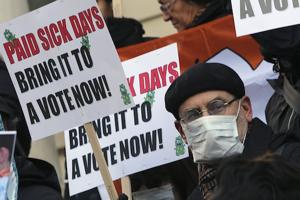City Unanimously Approves Paid Sick Days For 10,000 Workers

On Monday evening, the City Council of East Orange, New Jersey unanimously passed a paid sick days ordinance that will guarantee that workers in that city can take a paid day off when they or their family members fall ill.
An estimated 10,000 workers in East Orange currently don’t have access to any paid days off for sickness. But once it goes into effect, they will be able to earn an hour of sick leave for every 30 they work. Those at businesses with 10 or more employees can earn up to five days a year, while those with fewer can earn up to three. But workers who come into contact with the public, such as food service and daycare workers, will be able to earn five days either way. The law will go into effect 120 days from enactment.
East Orange passed its law within a week of Passaic, New Jersey, which also passed its law unanimously, and is the fourth city in the state to pass a paid sick leave measure. Activists have also pushed laws in the New Jersey cities of Irvington, Montclair, Patterson, and Trenton, and if those cities joined the others in passing laws 144,000 workers would get paid sick leave that didn’t have it before. A statewide bill will get consideration in New Jersey’s Assembly this month.
The law also comes on the heels of other recent progress: California passed a paid sick days law at the end of August, which is awaiting a signature from the governor, while Eugene, OR and San Diego, CA have also passed laws. Three cities passed laws last year, and with other laws that had already been on the books, the country now has two states and ten cities that have passed paid sick days.
The local progress stands in contrast, however, to the country as a whole. The United States is the only developed country that doesn’t guarantee that all workers can take a paid day off for sickness, leaving 41 million workers without access to leave. Low-income workers are even less likely to get leave — less than a third of those making $19,000 a year or less — as are some of the jobs that have the most contact with the public, such as those who work with food or care for children and the elderly.
Meanwhile, evidence from paid sick days laws that have been in effect for years shows that they don’t harm local economies — in fact many of them have outperformed after the laws went into effect. And while business groups may complain about paid sick days requirements, after the laws are enacted the vast majority end up supporting them.
***
This has been reposted from Think Progress.

